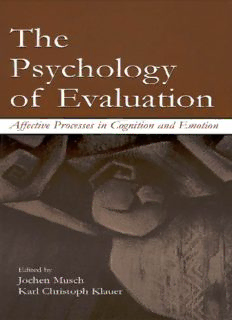
The Psychology of Evaluation: Affective Processes in Cognition and Emotion PDF
Preview The Psychology of Evaluation: Affective Processes in Cognition and Emotion
THE PSYCHOLOGY OF EVALUATION Affective Processes in Cognition and Emotion This page intentionally left blank THE PSYCHOLOGY OF EVALUATION Affective Processes in Cognition and Emotion Edited by Jochen Musch Karl Christoph Klauer University of Bonn LAWRENCE ERLBAUM ASSOCIATES, PUBLISHERS 2003 Mahwah, New Jersey London Copyright © 2003 by Lawrence Erlbaum Associates, Inc. All rights reserved. No part of this book may be reproduced in any form, by photostat, microform, retrieval system, or any other means, without the prior written permission of the publisher. Lawrence Erlbaum Associates, Inc., Publishers 10 Industrial Avenue Mahwah, New Jersey 07430 Cover design by Kathryn Houghtaling Lacey Library of Congress Cataloging-in-Publication Data The psychology of evaluation: affective processes in cognition and emotion, edited by Jochen Musch and Karl Christoph Klauer. Includes bibliographical references and indexes. ISBN 0-8058-4047-8 (c) Copyright information for this volume can be obtained by contacting the Library of Congress. Books published by Lawrence Erlbaum Associates are printed on acid-free paper, and their bindings are chosen for strength and durability. Printed in the United States of America 10 9 8 7 6 5 4 3 21 Contents List of Contributors ix 1 The Psychology of Evaluation: An Introduction 1 Jochen Musch and Karl Christoph Klauer PART I: MECHANISMS, BOUNDARY CONDITIONS, AND THEORIES OF AUTOMATIC EVALUATION 2 Affective Priming: Findings and Theories 7 Karl Christoph Klauer and Jochen Musch 3 The "Meddling-In" of Affective Information: A General Model of Automatic Evaluation 51 Dirk Wentura and Klaus Rothermund 4 Reverse Priming: Implications for the (Un)conditionality of Automatic Evaluation 87 Jack Glaser 5 The Hidden Vicissitudes of the Priming Paradigm in Evaluative Judgment Research 109 Klaus Fielder vi CONTENTS PART II: EVALUATIVE JUDGMENTS AND THE ACQUISITION OF EVALUATIONS 6 On the Acquisition and Activation of Evaluative Information in Memory: The Study of Evaluative Learning and Affective Priming Combined 139 Dirk Hermans, Frank Baeyens, and Paul Eelen 7 The Constructive Nature of Automatic Evaluation 169 Melissa Ferguson and John Bargh 8 The Hedonic Marking of Processing Fluency: Implications for Evaluative Judgment 189 Piotr Winkielman, Norbert Schwarz, Tedra Fazendeiro, and Rolf Reber PART III: INDIVIDUAL DIFFERENCES AND INDIRECT MEASURES OF EVALUATION 9 A Structural Analysis of Indirect Measures of Attitudes 219 Jan De Houwer 10 Beyond Verbal Self-Report: Priming Methods in Relationship Research 245 Rainer Banse 11 Putting Process Into Personality, Appraisal, and Emotion: Evaluative Processing as a Missing Link 275 Michael D. Robinson, Patrick T. Vargas, and Emily G. Crawford PART IV: THE ROLE OF EVALUATION IN MOOD, EMOTION AND BEHAVIOR 12 What Is Primed by Emotion Concepts and Emotion Words? 307 Paula M. Niedenthal, Anette Rohmann, and Nathalie Dalle 13 The Parallel Worlds of Affective Concepts and Feelings 335 Gerald Clore and Stanley Colcombe CONTENTS vii 14 Motor Compatibility: The Bidirectional Link Between Behavior and Evaluation 371 Roland Neumann, Jens Forster, and Fritz Strack Author Index 393 Subject Index 407 This page intentionally left blank List of Contributors Frank Baeyens, Department of Psychology, University of Leuven, Belgium Rainer Banse, Department of Psychology, Humboldt University, Berlin, Germany John Bargh, Department of Psychology, New York University, USA Gerald Clore, Department of Psychology, University of Virginia, USA Stanley Colcombe, Department of Psychology, University of Illinois, USA Emily Crawford, Department of Psychology, University of Illinois, USA Nathalie Dalle, Department of Psychology, University of Clermont-Ferrand, France Jan De Houwer, Department of Psychology, University of Southampton, United Kingdom Paul Eelen, Department of Psychology, University of Leuven, Belgium Tedra Fazendeiro, Department of Psychology, University of Denver, USA Melissa Ferguson, Department of Psychology, New York University, USA Klaus Fiedler, Department of Psychology, University of Heidelberg, Germany Jens Forster, Department of Psychology, University of Wurzburg, Germany Jack Glaser, Goldman School of Public Policy, University of California, Berkeley, USA Dirk Hermans, Department of Psychology, University of Leuven, Belgium Karl Christoph Klauer, Department of Psychology, University of Bonn, Germany Jochen Musch, Department of Psychology, University of Bonn, Germany
Description: